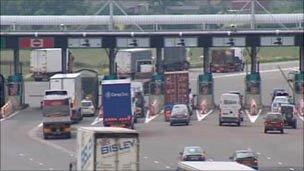Severn bridges: Welsh government study examines tolls' impact on economy
- Published

The number of vehicles using the Second Severn Crossing fell by nearly 7% in a year
A study into the impact of the Severn Bridge tolls on the economy in Wales is under way.
It was commissioned by the Welsh government, which says its findings will be used to put forward "any case for change" to the Department for Transport.
Business people have long complained the tolls have a negative effect on the economy.
Cars are now charged 拢6, vans 拢12.10 and 拢18.10 for lorries.
A Welsh government spokesperson said: "Last year we awarded a contract to Ove Arup to undertake a study into the impact of the Severn Crossing tolls, as well as assessing the overall balance of their effect on the Welsh economy.
"We anticipate publishing the final report later in the spring.
"The findings of this report will inform our discussions with the UK government on the future of the tolling regime and will ensure that we can put any case for change to the UK government on the basis of the best possible evidence."
Martin Evans, of the University of Glamorgan Business School, has been highly critical of the charges and believes they have a negative impact on economic activity in Wales.
"Obviously, tolls on a bridge suppress demand," he said.
"People will look for alternative ways even if they are a long distance. And then there will be people who will be put off from going from Wales into England and from England into Wales.
"This does impact on tourism - they might think twice about coming to Wales for the day."
Russell Shankland, of the Chepstow-based logistics company MCL, said his company was immediately at a disadvantage when in competition with companies across the border because he had to factor in the tolls.
'Cut-throat'
"It's cut-throat out there - everyone is undercutting each other. You know that the company down the road can always do it for less."
Mr Shankland's company will make at least 20 crossings over the bridge per day.
He said: "South Wales is down on its knees for so long, we need help to get back up."
A spokeswoman for Severn River Crossing plc, which runs the bridges, said: "We will await the results with interest."
Department for Transport figures released earlier this week revealed the M4 had lost its position as the busiest road between Wales and England.
Daily usage fell by nearly 7% in a year in the latest available statistics, the biggest decline of any of the major routes across the border.
But traffic from England to north Wales grew significantly during the same time and led to the A550 between Flintshire and Cheshire becoming the busiest route.
Tolls on both Severn bridges are likely to continue at their current level after a new deal with the company which charges the fee.
Severn River Crossing plc has been told it can run both bridges until it has taken an extra 拢33m, up to 拢1.02bn.
The bridges are expected to pass into public ownership by 2017, and MPs have said tolls should then be cut heavily.
But Mr Evans said he believed the best option was to continue with a high charge, collect a fund and then make the bridge free.
- Published14 April 2012
- Published30 November 2011
- Published25 November 2011
- Published4 November 2010